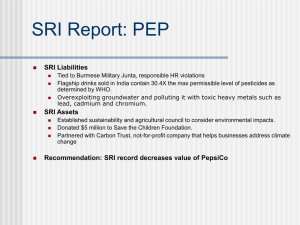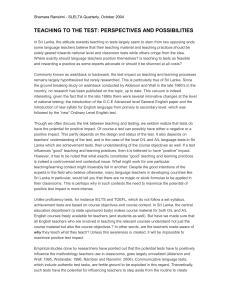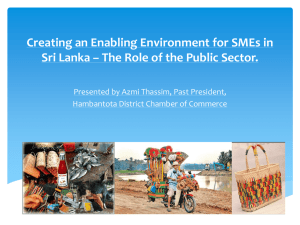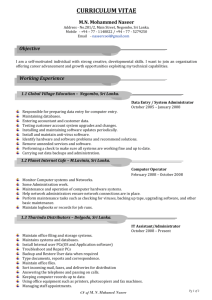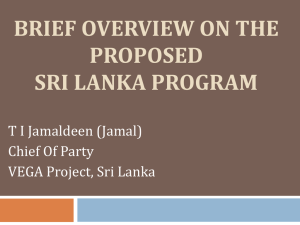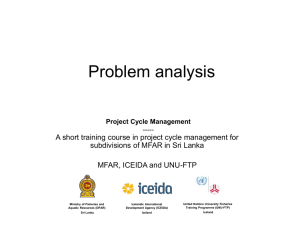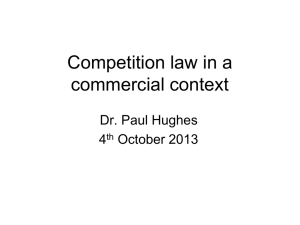Mr. Jagath Perera
advertisement
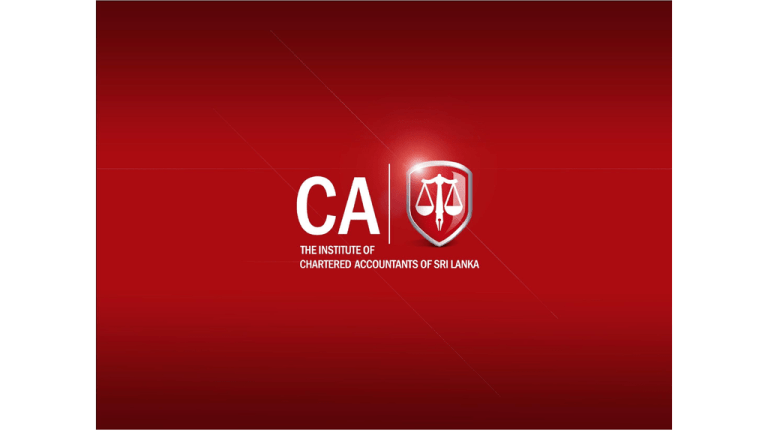
SAFA-IFAC Regional SMP Forum Session 1 Global & Regional Trends and Development Impacting SMPs Jagath Perera (CA Sri Lanka) 10th October 2014 Hotel Le-Meridien, New Delhi IFRS Convergence and Sri Lanka • Sri Lanka Accounting Standards 2014 BV is in line with IFRS 2014 BV. • Statement of Recommended best practice • Merger Accounting for Common Control Combinations • Not-for-Profit Organisations • Statement of Alternate Practice (SoATs) are effective in in Sri Lanka • Right-to-use of Land on Lease • Revaluation option for SMEs • SLFRS for SMEs • SLFRS for Smaller Enterprises (ED) 3 ISAs and Sri Lanka • 2009 Edition of the IFAC Hand Book • 36 clarified ISAs including SLSQC 1 • 2012 Edition of the IFAC Hand Book • Additions adopted • 2013 Edition of the IFAC Hand Book • To be adopted 4 Practices in Sri Lanka SMP’s in Sri Lanka 2% 1% 16% Sole Practitioner 2-5 6 - 10 > 10 81% 5 Challenges Faced by SME’s • Pressure to lower prices of products and services • Compliance with regulation • Competition • Lack of Demand for their products and services • Rising costs • Economic uncertainty • Attracting and retaining staff • Difficulties accessing finance Challenges Faced by SMP’s • Keeping up with new regulations and standards • Attracting and retaining clients • Pressure to lower fees • Attracting and retaining staff • Ability to adapt to changing client needs • Competition • Rising costs • Work-life balance • Keeping up with new technology Characteristics of SMPs in Sri Lanka • Traditional – mainly to audit and tax • No formal management structure & small • Concentrated in Western Province of Sri Lanka • More reliance on manual processes • Less access to resources and tools • Happy to work within the comfort zone Meeting the Challenges • Leveraging technology (Improving efficiency) • More Awareness among SMPs • Enhance the range of services • Learning and development Road Map for SMPs in Sri Lanka •Capacity Building •Continuity of Practice •Creating Synergy Capacity Building • Training – Audit tool kit is developed and Conducted awareness session – TTT Completed – Training in Progress • Best Practice Guidelines – Developing checklists, industry analysis, LOB guidelines • New Members in Practice – Orientation programmes • Networking Events – Events for experienced members in practice Continuity of Practice • Practice Management Guidelines • Quality Assurance Guidelines • Guidance on New Opportunities • Reduce Harmful Competition • Enhancing Support Services Creating Synergy • Technical Teams - Bridging the resource gaps - Emerging services • Positioning of the Members in Practice • Additional Support for the Members in Practice within Regions SMP Firm in 2020 • Equipped for new challenges– HR, Technology • Less Dependence on assurance • Specialized services to SMEs • Geared up to face regulatory pressure Conclusion • Need to explore new opportunities to encourage SMPs to move away from comfort zone • Enhance the market knowledge of value of audit • Assist to minimize the regulatory burden • Centralize training to keep up with new developments • Require assistance of professional body due to limited in-house resources Key Responsibilities – CSR, CG and MC Coordinator CSR Coordinator ● ● To be responsible for updating CSR checklist To coordinate with the CSR panel of markers and ensure timeliness and quality of delivery ● To report to the Committee the CSR results giving the necessary justifications CG Coordinator ● ● ● Thank You To be responsible for updating CG checklist To coordinate with the CG panel of markers and ensure timeliness and quality of delivery To report to the Committee the CG results giving the necessary justifications MC Coordinator ● ● ● To be responsible for updating MC checklist To coordinate with the MC panel of markers and ensure timeliness and quality of delivery To report to the Committee the MC results giving the necessary justifications


